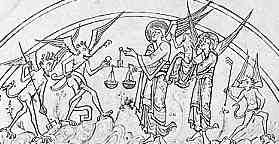
If you are looking at this page without frames, there is more information about medieval writing to be found by going to the home page (framed) or the site map (no frames).
| Scribes and Libraries of the Carolingian Court (4) | ||
| A couple of other brief comments from Einhard give us some questions to ask on the general matter of literacy in the Carolingian court, and the realm in general. He tells us that Charlemagne took great pleasure in the books of Saint Augustine and especially in those called The City of God. This oft-quoted statement is in direct juxtaposition to the information that he listened to public readings of stories or deeds of the ancients during meals. |
 |
|
| Image of the weighing of souls from a late 11th or 12th century copy of St Augustine's City of God (Florence, Biblioteca Mediceo-Laurenziana MS XII 17, f.1v). (From New Palaeogtraphical Society 1908) | ||
| With a sparse text like Einhard, there is a tendency to make too much of too little, but one cannot help but wonder whether the ambitious and pragmatic barbarian emperor was being a little bit literal minded about the coming of a finer Empire than Rome under a Christian God. That aside, there is a connection made between great and significant works of literature and oral performance. Literacy does not just allow a reader to sit alone and silent with the wisdom of the past. It allows that wisdom to be reinterpreted in the traditions of the day, which included oral performance. So long as there were those with the ability to perform, literate culture could be shared by those who were less skilled at reading. | ||
| The most-repeated comment from Einhard is that the emperor never mastered writing, despite the fact that he kept writing tablets and notebooks under his pillow to practise. However much or little you believe of Einhard, I like to think this is true. Perhaps it is simply the image of the great conquering hero stubbornly wrestling in private with the one thing he just cannot manage that appeals. | ||
| The question of how many people were literate in Charlemagne's empire, or how literate they were, is virtually impossible to answer. Because of the numbers of processes that were carried out at least partially through literate means, there must have been a fair bit of what Malcolm Parkes (Parkes 1991) called pragmatic literacy. This might range from having the capacity to read and write particular forms of documents, to simply recognising them by their layout and being able to spell out appropriate names or words. If most notaries were clergy and if a necessary part of the reception of a legal document was its reading aloud in public, then it is possible for most members of the laity to be engaged in literate processes of law or bureaucracy without themselves having much in the way of literacy skills. | ||
| The point has been made that for legal and bureaucratic processes derived from Roman law, which vanished from the written record in the 6th and 7th centuries, to reappear under Charlemagne, somebody had to have remembered them and to have been curating the records. Equally, literary works which were lost in late antiquity to reappear in the libraries of Carolingian abbeys, sometimes to disappear again until diligent scholars of the Renaissance turned them up somewhere centuries later, were never entirely lost. We have simply lost the key to tracing what was happening at those times. The Dark Ages are only dark for us. | ||
|
|
||
|
|
||
|
|
||
|
If you are looking at this page without frames, there is more information about medieval writing to be found by going to the home page (framed) or the site map (no frames). |
||